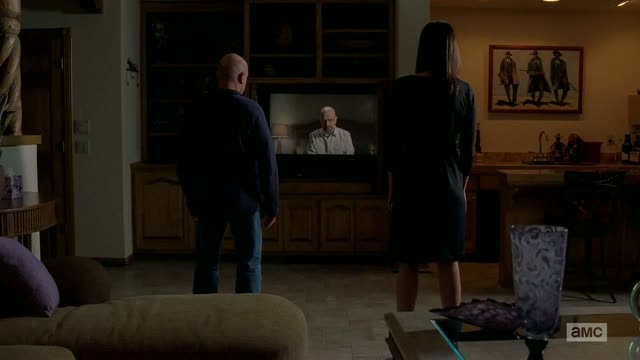
Written by Gennifer Hutchison
–
–
And yet it all begins innocently enough. In an unusually casual cold open, Todd, his uncle, and an associate (played by Justified veteran Kevin Rankin) swing by a diner to discuss Todd’s (reflected) past drug-smuggling glories, before some blood is casually wiped off of a boot, and off we go. The sequence may contain future payoffs – perhaps the blood is meant to be a byproduct of last week’s massacre, or perhaps it’s from a different event entirely – but mainly it exists to give us a false sense of what the rest of the hour is going to be like. Writer Gennifer Hutchison leaves us totally unprepared for the breathless pace of the rest of the episode.
Following that rather chat-heavy, Tarantino-esque opening (serious shades of the first 20 or so minutes of David Cronenberg’s A History of Violence, to boot), we resume where you might reasonably expect, with Jesse in the interrogation room with Hank, the latter eager to turn a former enemy into his key informant. If nothing else, “Confessions” provides ample opportunity for Aaron Paul to shine, which is important given that over the last season and a half, he’s mostly been reduced to a walking mechanism of grief and self-loathing. In this episode alone, Paul gets to sink his teeth into Jesse’s desperate need for guidance and love, along with his usual notes of spite, rage, self-hate, and utter disregard for his own livelihood.
Bryan Cranston, meanwhile, gets to reveal heretofore unseen levels of bastardry in Walt, which comes as a shock given that we already know just how subhuman he is. In the space of an hour, he manages to manipulate his biological son, his more-or-less-adoptive son, his wife (again), and his brother-in-law, against whom he makes a play so canny it would demand admiration, were it not so openly despicable. Sensing Hank’s weak position, Walt concocts a false confession that manages to toy beautifully with expectation while staying true to the parameters of the situation as we understand it. DP Michael Slovis, who directs the outing, milks the lo-fi texture of Walt’s phony missive for maximum anguish on Hank’s part, communicating the depth of the out-maneuvering we witness taking place via careful framing and timing. It’s important that we feel the depths of Hank’s failures as an investigator and prosecutor in these seconds, and we do.
Credit is also due to Bob Odenkirk, who plays to his dramatic (and, obviously, comedic) strengths this week as the sober mediator left to make the best of a very bad situation. The beauty of Saul as a character is that in all circumstances he is ultimately acting out of ruthless self-interest, even as it happens to dovetail with the interests of the terrible people he happens to represent. As he offers Jesse the promise of a new life in a very different place, there’s a sense that he longs for a similar sense of absolution very far away, only he’s left trapped by the terrible actions he’s either arranged, openly sanctioned, or willingly tuned a blind eye to. When Jesse storms his office (is the latter half of Season 5 going to amount to a series of climactic punches and slaps to the face?) and demands to know the truth of Brock’s poisoning, it really doesn’t matter if Saul had any awareness or not: in many senses, he’s the series’ true villain, the greased cog making it all happen while the world around him burns.
Speaking of burning, we know that Jesse won’t be successfully torching the White estate, which removes some of the sting of those frantic final moments, but imagining next week’s opening scene as being a very confused meeting between Jesse and Flynn/Walt Jr. might be the only thought that makes next week seem not so very far away.
Simon Howell

